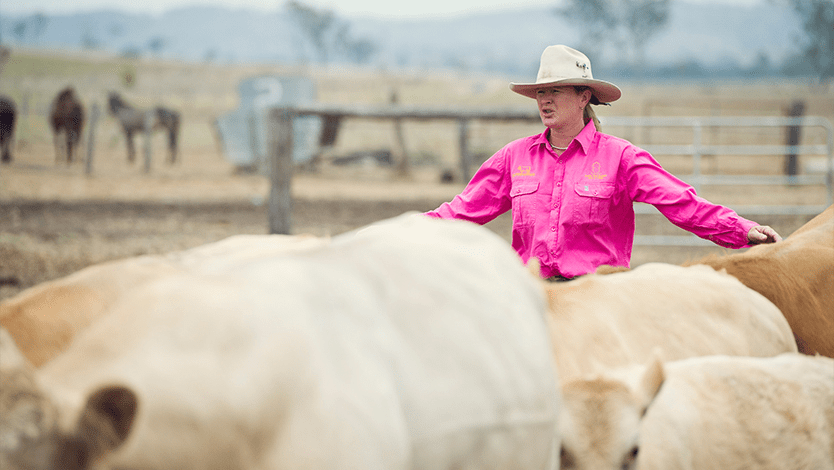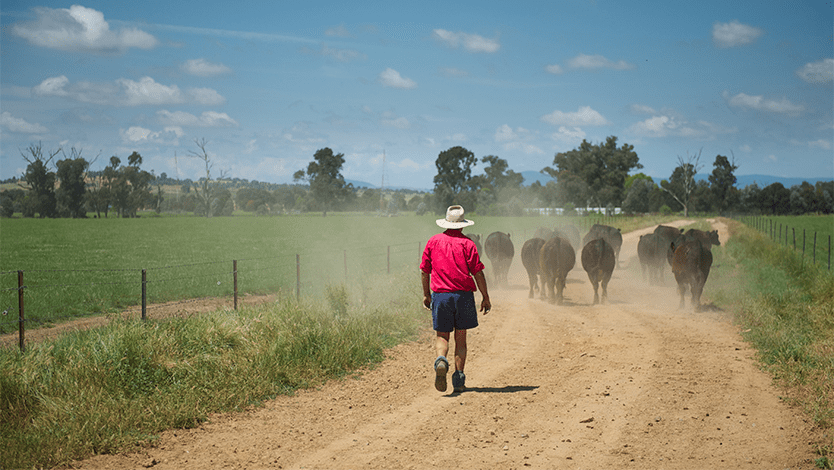Are Australian farming practices sustainable?
Yes they are. Australian farming practices are some of the best in the world. 94% of farmers undertake sustainable land management practices.
94.3% of Australian farmers undertook activities that helped prevent or manage weeds, pests, land and soil, at a cost of almost $3 billion.
The red meat industry collaborates with the Australian Government to invest over $13 million in research and development.
Discover how local livestock farmers are creating a sustainable future for all Australians.
What's in this article
Do farmers care about their environment?
Yes. Australian sheep and cattle farmers are committed to sustainable lamb and beef production and recognise the importance of undertaking practices that ensure a sustainable future for all Australians, and employ a diverse range of sustainable farming practices to safeguard the environment.
Yes. Australian sheep and cattle farmers are committed to sustainable lamb and beef production and recognise the importance of undertaking practices that ensure a sustainable future for all Australians, click here to learn some more and employ a diverse range of sustainable farming practices to safeguard the environment.
Sustainable farming initiatives that are underway include:
It is in the farmers’ best interests to create a sustainable future as they make their living on the land, and this is also important for their families, the broader community and future generations to come.
- Setting up a test station in 2010 (with Warren Drynan of Glenapp) to test beef cattle for feed efficiency with the aim of reducing methane emissions from livestock. This test station won the 2011 Queensland Landcare award for Innovations in Sustainable Farming Practices.
- the Carbon Farming Initiative – producers can claim credits for a reduction in emissions, which in large herds and with continued use of efficient sires can equate to another income stream
What are greenhouse gases, methane and carbon dioxide?
Yes. Australian sheep and cattle farmers are committed to sustainable lamb and beef production and recognise the importance of undertaking practices that ensure a sustainable future for all Australians, and employ a diverse range of sustainable farming practices to safeguard the environment.
Yes. Australian sheep and cattle farmers are committed to sustainable lamb and beef production and recognise the importance of undertaking practices that ensure a sustainable future for all Australians, click here to learn some more and employ a diverse range of sustainable farming practices to safeguard the environment.
Sustainable farming initiatives that are underway include:
It is in the farmers’ best interests to create a sustainable future as they make their living on the land, and this is also important for their families, the broader community and future generations to come.
- Setting up a test station in 2010 (with Warren Drynan of Glenapp) to test beef cattle for feed efficiency with the aim of reducing methane emissions from livestock. This test station won the 2011 Queensland Landcare award for Innovations in Sustainable Farming Practices.
- the Carbon Farming Initiative – producers can claim credits for a reduction in emissions, which in large herds and with continued use of efficient sires can equate to another income stream
Benefit-led copy that sets expectations around the video content.
Farmer Story
Bill & Deb Bray, Gippsland, VIC
Bill and Deb Bray have planted more than 30,000 native trees on their Gippsland, Victoria property over the last 20 years. They have fenced off 10 per cent of their property to protect remnant vegetation and have fenced off watercourses to establish wetlands with native species. By increasing the native vegetation on their property, the Brays have enjoyed a range of environmental benefits, as well as providing extra shelter for their livestock, which in turn makes the animals more productive.
Farmer Story
Anthony Waugh & Agness Knapik, High Steaks Farm, NSW
Meet Anthony Waugh and Agness Knapik who run High Steaks Farm, a 5000 acre patch of native bush and grasslands in the Central Highlands of NSW producing post-organic beef and lamb. They are passionate about the environment and animal welfare and believe that modern agriculture can happily co-exist with a healthy environment. By focusing on animal welfare and the general health of the environment, they feel that production will take care of itself.
The team’s focus is not just on sustainable farming but also on regeneration, which involves managing the whole ecosystem of the farm to ensure it is healthy, diverse and robust. This means taking care of not just the sheep and cattle, but also everything from the frogs, bugs, snakes and lizards through to grasses, trees and even smallest soil microbes.
The high quality beef and lamb produced on the farm is free from herbicides, pesticides, artificial fertilisers, growth hormone or antibiotics, with the animals raised exclusively on perennial native pasture.
Lorem ipsum dolor sit amet, consectetur adipisicing elit. Accusantium rerum possimus tempora soluta eveniet beatae dolor enim autem, fuga quaerat. Quam nisi alias commodi culpa, pariatur aut asperiores obcaecati possimus.
Lorem ipsum dolor sit amet, consectetur adipisicing elit. Accusantium rerum possimus tempora soluta eveniet beatae dolor enim autem, fuga quaerat. Quam nisi alias commodi culpa, pariatur aut asperiores obcaecati possimus.
Lorem ipsum dolor sit amet, consectetur adipisicing elit. Accusantium rerum possimus tempora soluta eveniet beatae dolor enim autem, fuga quaerat. Quam nisi alias commodi culpa, pariatur aut asperiores obcaecati possimus.
Anthony and Agness recognise the link between healthy land and healthy food, and this approach underpins every practice undertaken on the farm.
References
- http://www.mla.com.au/about-mla/Cattle-sheep-goat-industries/cattle-sheep-industry-information/cattle-sheep-and-sustainability/
- MLA-Brochure-FINAL-no-crop-marks.pdf
- 1. Australian Bureau of Statistics, Natural Resource Management on Australian Farms, 2006-07




